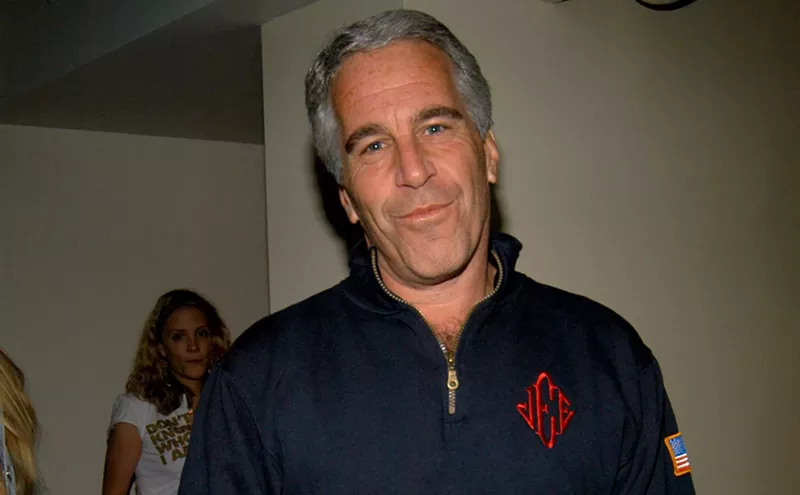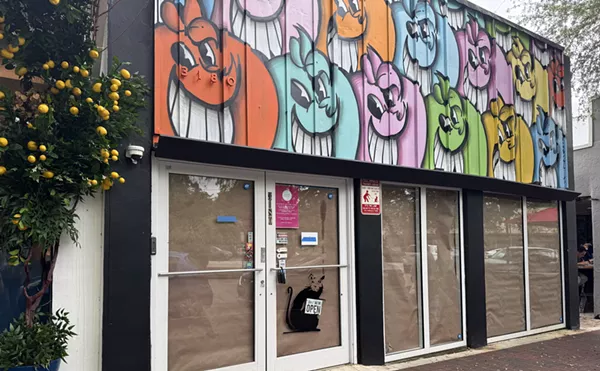Marty, as he is known in the WAD community, is currently under federal and state criminal investigation regarding his involvement in the takeover and sale of an Overtown apartment building once owned by the now-defunct Church of the Divine Mission. The City of Miami's Community Redevelopment Agency (CRA) bought the property in 2002 for $252,000, a price thought by some to be greatly inflated. Law enforcement authorities are trying to determine whether the money Siskind allegedly received from the transaction (an estimated $25,000) was tantamount to grand theft.
Since the publication of a New Times article chronicling the Divine Mission deal ("Grand Theft, Church," October 30, 2003), local artists and former business associates have come forward with tales of other alleged swindles contrived by Siskind involving artwork, antiques, and real estate deals.
For example, early last year ceramic and resin artist Mark DeLima thought he had scored some cheap live-in studio space when he moved into Siskind's 25,000-square-foot warehouse at 2200 NW Second Ave. The building is headquarters of the nonprofit Advocacy Foundation, which Siskind launched in 1997. According to a more recent mission statement it "assists deserving and indigent individuals involved in or accused of criminal conduct, in all stages of the judicial process." Tax records show the foundation's main source of revenue in 2001 was $102,423 from the sale of a house. The document also states that the 62-year-old Siskind draws no salary. An IRS service representative says the nonprofit did not file a tax return for 2002.
As the Advocacy Foundation's president, Siskind lured DeLima with a new project at the warehouse -- the Artopia gallery and artist studios. "Siskind was so polite and worldly," DeLima recounts. "He pumped me with these ideas that I would be working so much that [eventually] I wouldn't need the small loft space -- I would need the big warehouse next to the Advocacy Foundation."
DeLima spent months making decorative tiles for a fundraising project Siskind had supposedly lined up with the Allapattah branch of the Greater Miami YMCA. DeLima also waited in vain for Siskind to install a shower as part of a plan to create four artist lofts in the warehouse. "I lived in this rat-infested dirty shell for six months until I couldn't take the threats and sick personality of that pathetic individual," DeLima says, adding that Siskind never compensated him for the tile work and kept his $500 security deposit.
During his Artopia tenure, DeLima says he also observed indigents arrive regularly with what he suspected was stolen merchandise, which Siskind would buy for a pittance. "That's not to mention the Sunday rendezvous with sexy women who entered the Artopia building from the rear and stayed for only fifteen minutes -- all in the name of community service," DeLima smirks. "What a scam and grip he has on the poor and unfortunate."
Siskind chuckles at DeLima's accusations. "Oh, yeah. Sure, sure," Siskind says. "There's no truth to that whatsoever."
Then there is Evo, a collage artist whose Wynwood studio is near the Advocacy Foundation. Evo (she uses her first name only) reports that Siskind persuaded her this past April to bring three of her assemblages to his warehouse for what she thought was to be a May 9 exhibition. "I'm pumped up," she recalls. "I'm thinking I met the man who's going to help my career." But as the date approached, the absence of publicity for the show began to trouble her. She mentioned her concern to her neighbor Purvis Young, the vaunted primitivist painter. Young told her that Siskind had pulled a similar stunt in 2002 with about ten of his paintings. Gallery owner Fred Snitzer, who represented Young at the time, had to sic lawyer Harold Rifas on Siskind. Rifas demanded return of the paintings, which could have fetched upward of $10,000. "I hate to see people take advantage of artists," Rifas says. Evo finally retrieved her artwork, relying on the power of her own shouting. The May 9 exhibition never took place.
"I know nothing about that whatsoever," Siskind responds. "Evo, she never dealt with me at all, so I have no idea what you're even talking about there."
Later in the year Siskind also sweet-talked Anne Treadway, owner of the Wynwood antique shop Miami Mid-Century on NW 34th Street and North Miami Avenue. He tried to persuade her to move her entire inventory to his warehouse, where he also runs a store called Thriftopia. She agreed only to give Siskind two antique lamps on consignment, she says. If he sold them, they would share the proceeds. But Treadway was not at Miami Mid-Century when Siskind picked up the lamps. She was later shocked to discover he'd taken five lamps and $600 worth of furniture. Total haul, by her estimate: $3000 worth of merchandise. "This man is so horrible," Treadway fumes. "I just want to see him put away." As of early November Siskind had not returned her wares. "Ah," Siskind responds to Treadway's allegation, feigning bemusement. (Neither Treadway nor Siskind responded to requests for further comment.)
Perhaps Siskind's most daring Wynwood performance was the one that enticed architect Robert Swedroe. During his career, Swedroe has designed scores of luxury condominium buildings from Las Vegas to Coral Gables, including the Las Olas Grand in Fort Lauderdale and the Blue and Green Diamonds in Miami Beach. Siskind first charmed Swedroe's son Marc by telling him about the Advocacy Foundation's charitable work. Motivated by a philanthropic impulse, Robert Swedroe agreed to help his son buy the warehouse. (The Advocacy Foundation holds a lease on the property with an option to buy.) The elder Swedroe deployed his son-in-law, attorney Howard Weinberg, to handle the deal, which was intended to provide the foundation with financial security. Weinberg sat down with Siskind and his brother Richard Siskind. "I met them and I met their mother and everything to get a feel," says the attorney. "They're very, very good at what they do, because I believed them -- for a time."
Weinberg in June created a corporation called M&M Investment Properties Group, which listed Martin Siskind and Marc Swedroe as officers. "We formed that company in anticipation of purchasing the Advocacy Foundation building," Weinberg relates. "The Swedroe family was to provide a living and working environment for emerging artists. The Swedroes are architects; they were going to design a space that worked functionally for artists."
The closing was scheduled for late November. Weinberg won't reveal how much money his father-in-law deposited toward the purchase of the warehouse, but he suggests the building's market value is at least a million dollars, which means the deposit could be $100,000 or more. The money is currently in an escrow account controlled by one of Siskind's lawyers. "As soon as we found out what type of person Siskind was, we declined to move forward," Weinberg explains. "We consider Marc Swedroe to have been defrauded because of the most important criterion in the deal from the beginning. The first thing I ever said to them: 'You've got to be the salt of the earth to do a deal with the Swedroes. That's the number-one consideration.' So I considered the deal to have been made as a result of fraudulent representation."
Now the Swedroes are preparing to take Siskind to court to dissolve M&M Investment Properties Group and recover their deposit. "It turns out that [Siskind] was a con man, and he defrauded us by telling us, among other things, that he was honest, that he was reputable, that he was beloved in the community, that he was not motivated by money, that the purpose of the not-for-profit was to help people get a second chance," Weinberg says. "All of that, it turns out, was complete bullshit."
Siskind had nothing to say about the Swedroe deal: "I don't know. You'll have to ask them."












